At Sakari Farms, Spring Alaska Schreiner maintains a seed bank, has launched a community kitchen, and teaches Native American youth traditional ecological knowledge.

At Sakari Farms, Spring Alaska Schreiner maintains a seed bank, has launched a community kitchen, and teaches Native American youth traditional ecological knowledge.
September 18, 2023
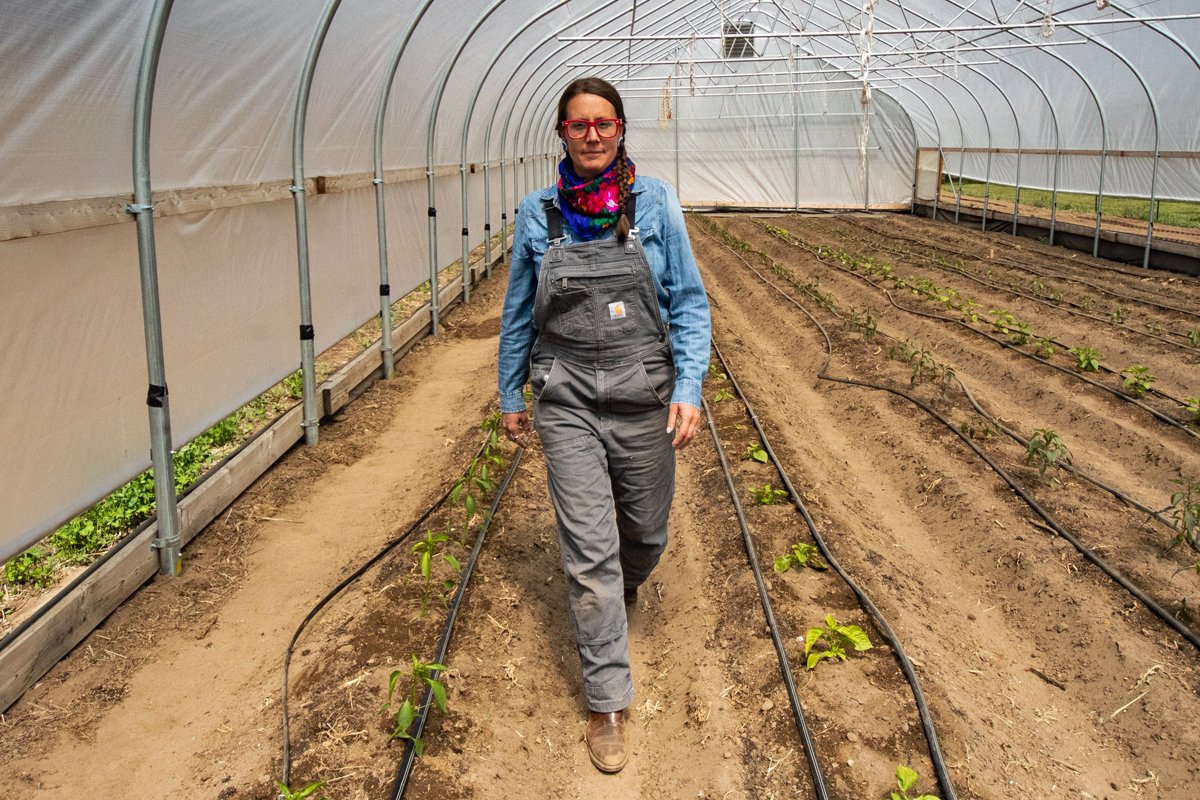
Spring Alaska Schreiner in her greenhouse at Sakari Farms near Bend, Oregon. (Photo courtesy of Spring Alaska Schreiner)
Like many Alaska Natives, Spring Alaska Schreiner (Chugach Alaska Native Corporation / Valdez Native Tribe) grew up exercising her subsistence rights with her family—gathering berries, digging clams with her mom, catching and cleaning fish alongside her uncles. She recalls being surrounded by endless natural bounty throughout her childhood in Valdez, a waterfront city situated near the head of a deep fjord in Prince William Sound. When she moved to Oregon in 2006, she noticed a contrasting lack in access to culturally relevant foods, which has been a driving force behind her decades-long work championing Indigenous food sovereignty through agriculture, advocacy, and activism.
At her 6-acre Sakari Farms outside Bend, Oregon, Schreiner employs traditional ecological knowledge to cultivate regional first foods—foods consumed before European colonialization—and passes that expertise down to Native American youth.
“We have created a template for a tribal farm, which operates very differently than a standard non-Native farm.”
The operation started out with an urban nursery growing plants to makes salves, tinctures, oils, and lotions through Schreiner’s company, Sakari Botanicals. In 2018, the farm expanded and moved to the current high-desert property, which, in addition to growing crops such as peppers, tomatoes, potatoes, garlic, and herbs, also houses an Indigenous seed bank and a new community kitchen called Niqi Native Kitchen.
“I have always been the nerd with my head in the soil trying to learn more,” she explains. “Many tribes in Alaska are very intertribal, sharing similar foods and waterways. There’s not a lot of access up there with highways, and a lot of [traveling is] done by air and water, so we’re always sharing. That’s what food sovereignty is: becoming self-sufficient while also helping others secure food for themselves. I wanted to create that sense of community here in Oregon.”
She’s done just that, developing a hub for Native producers, chefs, and other folks to gather for education and inspiration. Today, Sakari offers hands-on farming and cooking classes, hosts long table dinners, and provides free tribal food boxes containing nutritious, culturally relevant ingredients to those in need—a pandemic initiative to help fight food insecurity among the local Indigenous community that has continued. The farm is not a nonprofit organization, so Schreiner depends largely on small one-off grants, crowdfunding, and limited wholesale revenue to finance Sakari’s many efforts—all of which center on traditional ecological knowledge.
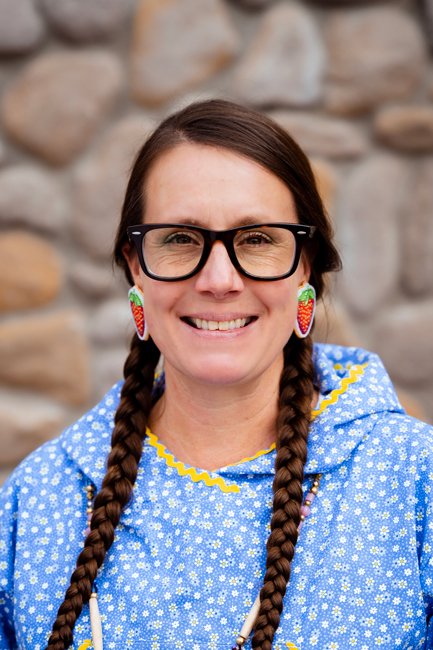
Spring Alaska Schreiner, owner of Sakari Farms outside Bend, Oregon. (Photo courtesy of Spring Alaska Schreiner)
“We have created a template for a tribal farm, which operates very differently than a standard non-Native farm,” explains Schreiner, who has a background in natural resource management, soil science, and water conservation. “We only grow things once [a year], because Native people have always used the whole plant, including the seed. We don’t want to trash the soil by turning crops all the time; we have volcanic ash here, which is like moondust, with little to no water. And we’re protecting these traditional Native plants that we grow for communities like the Hopi Nation and the Oneida Nation in the seed bank.”
Come autumn harvest after a short growing season of about 58 days, Sakari donates most of the yield to regional tribes with distribution assistance from state agencies. What remains is turned into teas, jams, sauces, and other shelf-stable products that are sold wholesale to Native-owned businesses and bear the Intertribal Agriculture Council’s Made by American Indians seal. “We’re growing this for our people,” Schreiner affirms. “I don’t want anyone eating out of commodity food centers anymore. We don’t just grow beans; we show you how to take care of the seed and plant, then use the beans to become self-sufficient—so that we’re not eating beans out of a can.”
That’s where the new 900-square-foot tribal commercial kitchen comes into play, akin to chef Sean Sherman’s incubator Indigenous Food Lab. Two years in the making, Niqi Native Kitchen serves as a culinary playground for area tribes, aspiring chefs, and Native youth to train, develop recipes, and participate in workshops. It’s also home base for Sakari-employed chefs like Pao Rodriguez, who cook up fare such as buffalo empanadas, huckleberry pie, and blue corn cookies to be sold at farmers’ markets.
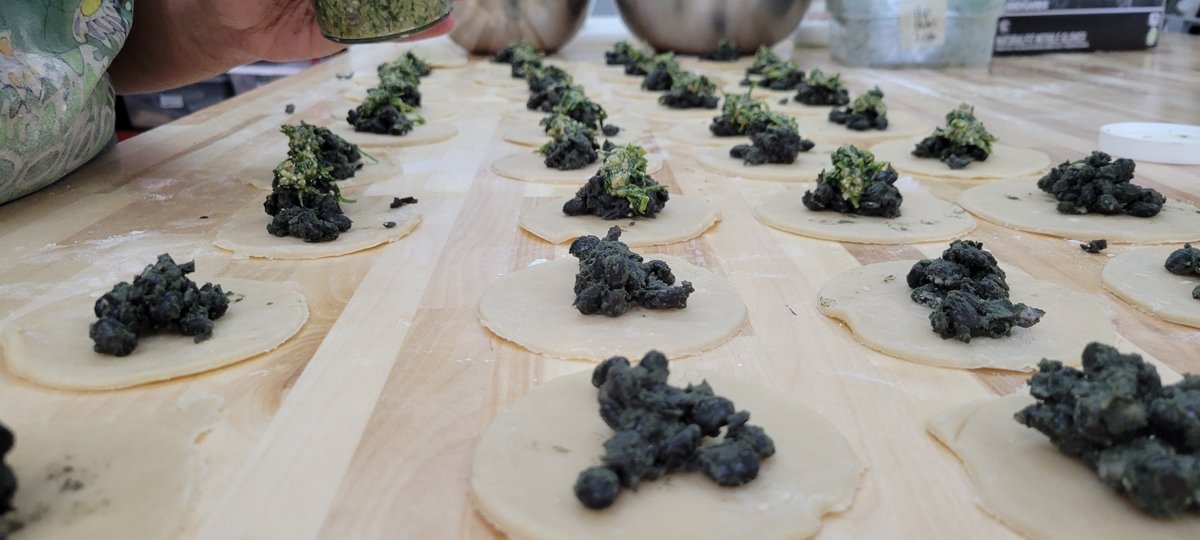
A scene from the new 900-square-foot tribal commercial kitchen, where Native chefs can experiment with traditional ingredients. (Photo courtesy of Spring Alaska Schreiner)
“We’re teaching youth how to do it from start to finish,” says Schreiner. “They can learn how to grow and harvest traditional foods, make their own recipes in the incubator kitchen, and market and sell their products. The farm is a safe space for Natives to come together, honor Indigenous traditions, and learn how to be Native again after experiences like displacement, generational trauma, and other factors beyond our control.” To further lift up Native producers, she also recently launched the Pacific Northwest Tribal Agriculture Guide, a free online resource that encourages consumers to buy from Indigenous entrepreneurs.
Schreiner’s extensive advocacy work also often takes her off the farm to push for legislation supporting BIPOC growers and combatting climate challenges. For instance, her testimony was instrumental in the 2021 passing of Oregon’s $100-million drought relief package. This year, she has been involved in the state’s SB 530 natural climate solution bill (which was enacted in July as part of a larger climate-resilience package) and HB 2998 healthy soil bill (which did not pass).
She serves on several national and regional agricultural boards and participates in organizations such as the Intertribal Agriculture Council, First Nations Development Institute, Native American Food Sovereignty Alliance, Oregon Climate and Agriculture Network, and more. But she can’t do this work alone; Schreiner credits collaborators like Ben Jacobs, owner of Tocabe restaurant in Denver, Colorado, who has long cooked with Sakari-grown ingredients and promoted the farm’s products in the restaurant’s online marketplace.
In 2022, the environmental nonprofit Ecotrust called Schreiner “a leader who looks to the future” when it gave her one of its prized Indigenous Leadership Awards. And that’s not where the community admiration ends.
“To see Spring grow from a botanical grower to a full-scale farm that retails specialty foods demonstrates just how dedicated she is to revitalizing tribal food economies,” says Latashia Redhouse, the Intertribal Agriculture Council’s American Indian Foods director. “She has such an energetic girl-power personality that really ignites the network of tribal growers and entrepreneurs. Her impact is significant, as she leads many initiatives fueled by her passion to feed her family and community healthy and culturally relevant foods, all while being a good relative to the land, water, and environment.”
“I’m working hard to represent Native women farmers, because there are so few of us,” Schreiner says of her policy work, which directly impacts the livelihoods of growers like herself. Since she and her husband, Sam (who serves as farm manager), purchased the Deschutes County farmland back in 2018, they have endured wildfires, hailstorms, flooding, and drought. In fact, Central Oregon has recently faced some of the worst drought conditions in the country, with neighboring Crook County spending 87 weeks in exceptional drought, the U.S. Drought Monitor’s worst designation.
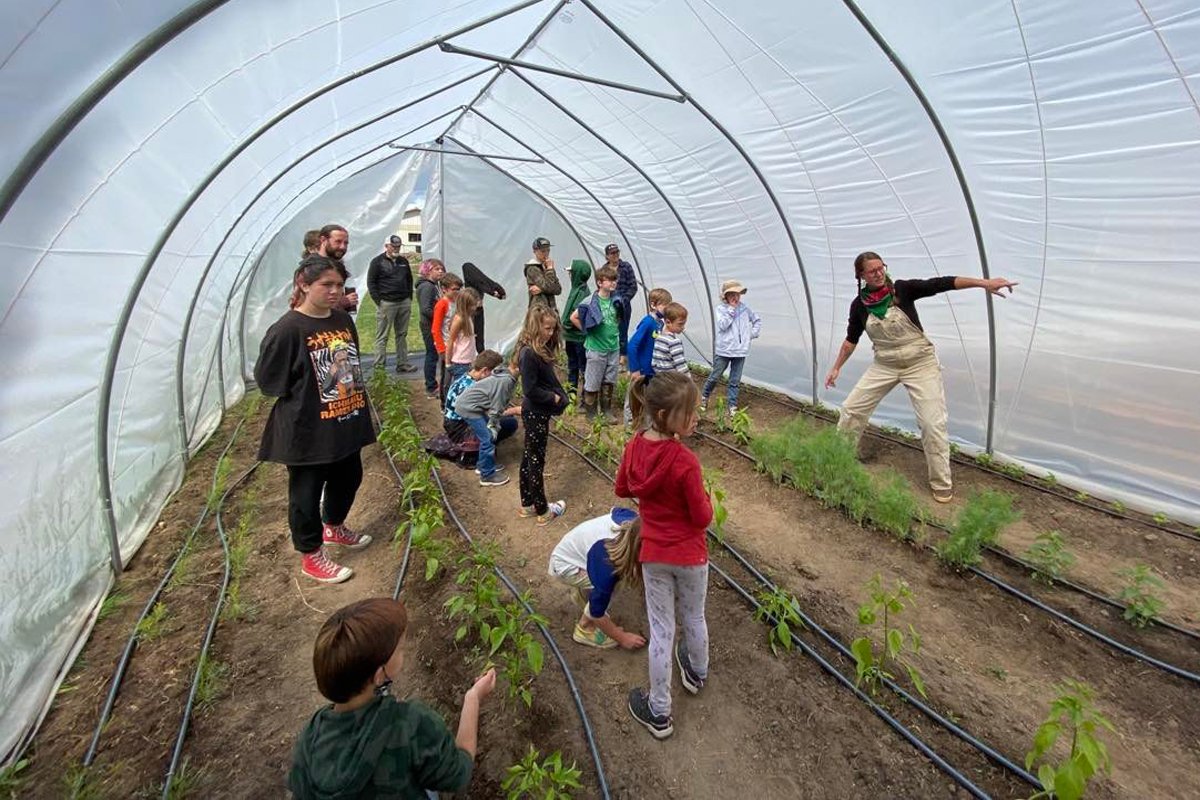
Sakari Farms offers a program that teaches youth how to grow and harvest traditional foods. (Photo courtesy of Spring Alaska Schreiner)
“Here in the high desert, the tribal people are extremely resourceful; I’m just carrying on that tradition and making the farm as climate-savvy as possible,” says Schreiner. “We’re dealing with the worst climate situations right now, yet our crops look great. I think some of the blood memory in this ancestral seed is digging the drought. The Hopi corn from 200 years ago is like, ‘We’ve been waiting our whole lives for this.’ It’s 10 feet tall now, whereas it should only be 5 or 6 feet tall.”
She believes that the practices she utilizes, which include growing cover crops and using controlled burns, can help fight climate change and prefers the term Native agriculture over “regenerative agriculture,” which she believes has been hijacked by conventional farmers hoping to benefit from greenwashing. But for traditional ecological knowledge to be effective in mitigating negative impacts, Schreiner says, it needs to be recognized and adopted on a larger scale. “For the future of food sovereignty, I hope that the agricultural industry starts acknowledging Native producers, paying us more, and learning the ways we’ve cared for the land since time immemorial,” she adds.
To that end, Schreiner is optimistic that the 2023 Farm Bill will be a step in the right direction. “It’s really moving forward in a good way for Native farmers,” she says. “The Intertribal Agriculture Council has been pivotal for years, pushing for more representation at the table. And Zach Ducheneaux, who has a long history with the IAC and now runs the USDA’s Farm Service Agency, has really come out for us. We’re already seeing a shift for disadvantaged BIPOC farmers when it comes to access to disaster relief funds and different loan opportunities.” For instance, Sakari recently secured loans to put up a greenhouse to prolong the growing season through Akiptan, a Native-focused community development financial institution (CDFI).
Adding another title to the long list of hats Schreiner already wears—mom, connector, ecologist, educator, activist, advocate, seed saver, Indigenous food warrior—she also recently co-produced a feature-length film, A Reflection of Life. The documentary delves into the climate change–induced water issues of the Pacific Northwest, with a focus on the effects on Native communities. It premiered in April and has since become a film festival darling; Schreiner is hopeful it will get streaming distribution soon in order to reach a wider audience.
Just like the many initiatives underway at Sakari Farms, it all comes back to sharing knowledge for Schreiner. She aims to do more of that in the coming years, with a focus on policy work and storytelling. “The goal is to someday hand the farm over to tribal youth so that I can use my brain rather than my body at this point in my life,” she says with a laugh. “We don’t have a lot of advocates in Indian Country, and I’m really good at speaking up for myself and others. I’d like to spend more time sitting down with tribal members, listening to their needs, and helping make it happen.” Although that involves a slight shift in focus, it still very much reflects her life’s work: sharing her unique talents with the Native community.
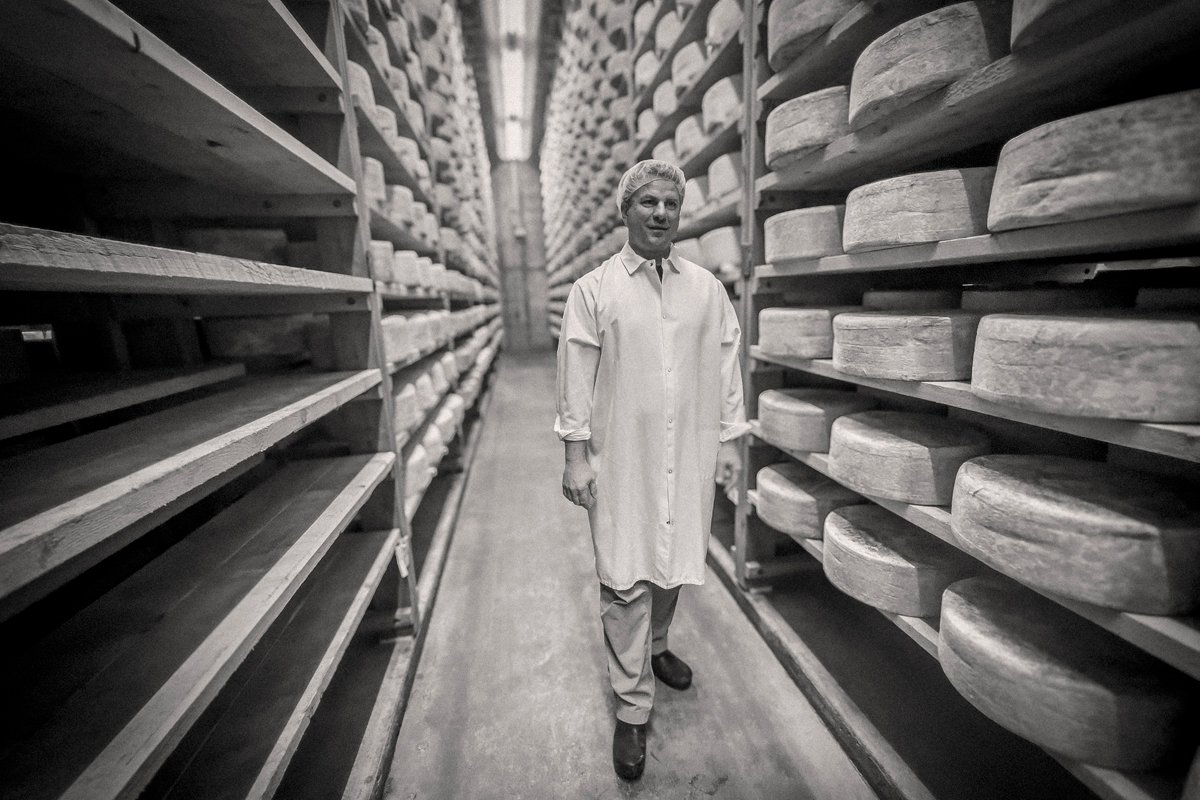
September 4, 2024
By paying top dollar for milk and sourcing within 15 miles of its creamery, Jasper Hill supports an entire community.
September 3, 2024

August 27, 2024

August 26, 2024

Like the story?
Join the conversation.